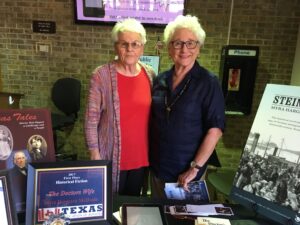This week Austin hosted the Civil Rights Summit celebrating President Lyndon Johnson’s amazing efforts to pass the 1964 Civil Rights Act and the 1965 Voting Rights Act, legislation that changed the course of American history. The Felix Longoria Affair reveals only one painful account of life in the Jim Crow South before LBJ stood up to the practices that stained this country’s heritage.
In 1948 the remains of Private Felix Longoria were recovered from the Philippines where he had been killed while serving on a volunteer mission

near the end of World War II. His body was shipped to his home in Three Rivers, where a barbed wire fence cordoned off the Mexican section of the cemetery. When Longoria’s widow tried to arrange for his wake in the local funeral home, the director refused to allow the family to use the chapel. He claimed that at previous Mexican-American services there had been disturbances and also that “the whites would not like it.” The funeral director offered to hold the wake in the family’s home on the Mexican side of town, which was the custom in Three Rivers.
Private Longoria’s widow and her sister turned to Dr. Hector Garcia who had recently founded the American G.I. Forum, a group of Texans that worked to secure equal rights for Hispanic veterans. After Dr. Garcia received the same negative response from the funeral director that Mrs. Longoria had received, he sent telegrams to Texas congressmen asking for their support. Immediately Senator Lyndon Johnson responded, offering to arrange for the burial at Arlington National Cemetery. Word spread of the discrimination with an article in the New York Times, and Walter Winchell commented on his radio program, “The big state of Texas looks mighty small tonight.”
On February 16, 1949, the funeral service took place with full military honors at Arlington National Cemetery in the presence of Private Felix Longoria’s family, Senator Johnson, and a representative of President Harry Truman.
The Texas House of Representatives authorized a five-member committee to investigate the Felix Longoria affair. After open hearings at the Three Rivers Chamber of Commerce, the committee decided that although the funeral director acted in anger, he had apologized, and he had not discriminated against the Longoria family. The report was never filed as committee members began to back peddle with comments such as the director’s words “appear to be discriminatory” and the director’s actions were on “the fine line of discrimination.”
The Civil Rights legislation that LBJ pushed through Congress in the 1960s began the long road toward reversal of discrimination in this country. The Civil Rights Summit of 2014 highlights and encourages the continuation of that march toward equality for all our citizens.

Hard to believe!
I agree. Some of the things that have happened in our race relations in this country are heart-breaking.
It is hard to imagine how anyone could justify such disrespect for someone who died for their country.
Many in the town were still unhappy in recent times when a historical marker was placed at the former site of the funeral home.